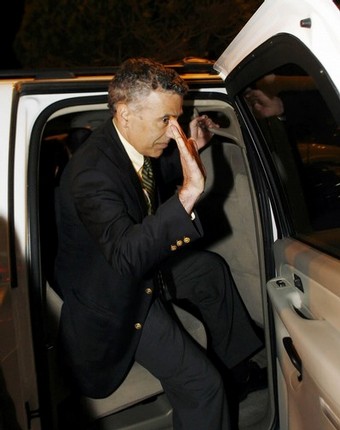|
|
|
Bolivian President Evo Morales: "The one who conspires against democracy and above all seeks the division of Bolivia is the ambassador of the United States," Morales said during a speech at the presidential palace ... "We don't want people who are separatists, who foment divisions, who conspire against unity," Morales said, referring to US Ambassador Philip Goldberg. |
September 12, 2008
BBC
Washington expels Bolivian envoy

Bolivia accuses the US envoy in La Paz of "conspiring against democracy" |
The US says it is expelling Bolivia's envoy in Washington, a day after the US ambassador was told to leave Bolivia.
The US move comes after Bolivian President Evo Morales blamed the US envoy for inciting protesters in Bolivia - a claim denied by Washington.
And Venezuelan leader Hugo Chavez now says he will expel the US envoy in Caracas, in solidarity with Mr Morales.
In Bolivia, at least eight people were killed in clashes between pro- and anti-government groups on Thursday.
The fighting between rival supporters took place in the remote northern province of Pando, officials said. At least 20 people were injured.
Bolivia has seen large protests in recent weeks by opponents of President Morales's economic and social policies.
'Grave error'
In a response to Mr Morales' move against the US envoy, the US state department declared that the Bolivian ambassador in Washington, Gustavo Guzman, was "persona non grata".
|
Violence has flared in eastern Bolivia
|
State department spokesman Sean McCormack said the decision was taken "in response to unwarranted actions, and in accordance with the Vienna Convention [on diplomatic protocol]".
Reacting to the decision to expel Mr Goldberg, whom Mr Morales accused of "conspiring against democracy" and encouraging the break-up of Bolivia, Mr McCormack said it was a "grave error" and described the accusations as "baseless".
Later on Thursday, Venezuelan President Hugo Chavez said the US Ambassador in Caracas, Patrick Duddy, had 72 hours to leave the country.
Mr Chavez also said he was recalling his envoy from Washington.
Military protection
The eight deaths in the remote jungle region of Pando happened as pro- and anti-government protesters fought each other with clubs, machetes and firearms, officials say.

Mr Morales wants to carry out land reforms to bring wealth to poor areas |
Seven of the victims were farmers killed by opposition activists, reports say.
A government spokesman described the killings as a massacre.
Protesters have also been blocking roads and occupying buildings in eastern regions, which are home to Bolivia's important natural gas reserves.
Opposition groups want greater autonomy as well as more control over revenues of natural gas in their areas.
They object to Mr Morales's plans to give more power to the country's indigenous and poor communities, by carrying out land reform and redistributing gas revenues.
On Monday, the government announced it was sending the military to protect gas fields and infrastructure from demonstrators and guarantee exports to neighbouring countries.
On Wednesday, officials said saboteurs had caused a blast on a pipeline, forcing them to cut natural gas exports to neighbouring Brazil by 10%.
The Brazilian foreign ministry said in a statement that the government was taking the necessary measures to guarantee gas supplies in the country.
The statement also expressed Brazil's "grave concern" at the events in Bolivia, and deplored the outbreak of violence and attacks on state institutions and public order.

